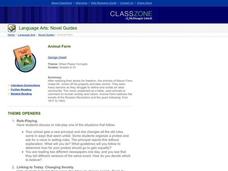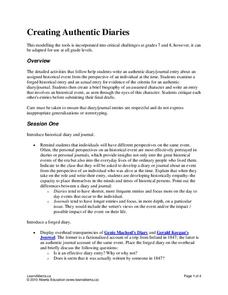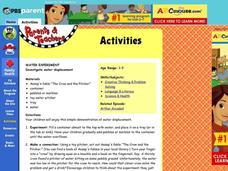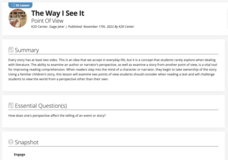Lied Center of Kansas
The Ugly Duckling and The Tortoise and the Hare
Both The Ugly Duckling and The Tortoise and the Hare are great additions to an elementary language arts lesson. Young readers focus on the literary elements of each story, including characters and plot development, and apply...
Curated OER
Technology-commected Folklife Lesson Plan: Fables
Learners discuss ways the stories were alike and different. The teacher demonstrate how to draw a Venn diagram using Microsoft Word. They label the two circles and enter the likenesses and differences on the diagram.
Curated OER
Animal Tales Around the World
Students explore characteristics of Indian Tales/ Parables. In this literature lesson, students compare contemporary society to western culture through analysis. Students create their own tales using this genre.
Curated OER
The Empty Pot: A Lesson About Integrity
Learners discuss whether honesty really is the best policy with a lesson on "The Empty Pot," a Chinese fable about integrity. After reading the story, class members answer several comprehension and reflection questions about what...
Curated OER
Mayan Myths/Folktales
Middle schoolers work on summarizing a story, and they determine if it is a legend, a myth, or a fable. Working in groups to read and summarize stories, they then list evidence whether the tale is a myth, fable, or...
Curated OER
Fate vs. Mind: A Macedonian Folk Tale
High schoolers read examples of folk tales and describe the characteristics of fables and folk tales. They also examine the concept of fate and if it plays a part in people's lives.
Curated OER
J. Paul Getty Museum Education Staff
Students will examine a manuscript page from a Flemish bestiary and discuss how it was used to teach ideas about Christianity. In this Christianity lesson plan students study the given manuscript and then compare the stories from the...
Curated OER
Shadow Puppetry in South India
Students read a variety of literature from India, including folktales and fables. They then select a scene or story to script, work together to design and craft shadow puppets of characters and scenery, narrate a story, manipulate the...
Curated OER
Animal Farm
Students read Animal Farm and examine how power corrupts. They role-play situations involving power and control. They investigate corruption and abuse of power in society. They write propaganda articles and hold panel discusssionsabout...
Curated OER
Goldilocks and the Three Bears
Students print out the pictures of bears to retell the story of Goldilocks and the Three Bears. In this fable lesson, students use the bears to retell the fable story.
Curated OER
A Story of Giving
Students read a fable and identify their traits and values. They discuss how their family gives to others. They also predict the results of a lifetime of philanthropic giving.
Curated OER
Tortoise and Hare Races
Students listen to the fable, The Tortoise and the Hare, and participate in various map skill activities. They manipulate magnetic tortoises and hares on metal cookie sheets to practice direction, and construct racing tortoises out of...
Starfall
Not too Little to Help
For this language arts activity, students write two short paragraphs: one about how they could help someone bigger than themselves and one about how someone littler could help them. A picture of a lion and mouse is on the page; this...
Curated OER
Froggy Fun Activities
In this worksheet based on the book, A Froggy Fable, students find hidden pictures, draw a frog and complete a maze activity.
Alberta Learning
Creating Authentic Diaries
Napoleon Bonaparte once said, "What is history but a fable agreed upon?" A series of lessons encourages learners to look beyond the basic fable agreed upon related to events in history and consider multiple accounts of the event....
Curated OER
Water Experiment
Here is a great instructional activity designed for very young scientists. In it, they act out the famous Aesops fable, "The Crow and the Pitcher." In doing this, they get to experience water displacement first-hand. Some terrific...
Savvas Learning
Verbs: Future
As part of their study of future tense verbs, language learners engage in activities, read fables, and sing songs. The 25-page packet includes detailed lessons, worksheets, graphic organizers, and answer keys for assessments.
Curated OER
Lesson: All in a Name
Lao Tzu was the fabled author of the Toa te Ching, Lau Tzu is also the name of a large sculptural piece. Kids examine Mark di Suvero's larger-than-life sculptures in relation to the elements of art they've learner about. They examine...
West Contra Costa Unified School District
Talking About Distance, Rate and Time
Connect the tortoise and the hare fable to mathematics. Learners first identify key terms related to distance, rate, and time. They then solve distance/rate/time problems using different representations.
Overcoming Obstacles
Being Responsible
Responsible-decision making is the focus of the social-emotional learning lessons. After reading, The Ant and the Grasshopper: An Aesop Fable, scholars come up with six steps to take responsibility for their actions and then practice the...
K20 LEARN
The Way I See It: Point of View
Robbers see a house from a different perspective than real estate agents. That's the big idea in a lesson about point of view. Groups assume the role of either robbers or real estate agents, note important details in a description of a...
Asian Art Museum
Telling Tales with Kamishibai
Kamishibai (paper drama), is a Japanese form of storytelling that uses emakimono (paper picture scrolls), to relay a moral lesson. As part of a series of resources that examine Japanese art and artists, learners watch a video...
Curated OER
Introduce: Summarizing Narrative Text
When scholars re-tell a story, do they boil it down to important details in a logical order? Practice summarizing narratives using this think-aloud strategy, which is scripted here for your convenience. After explaining why this is an...
Curated OER
Joseph Had a Little Overcoat Lesson Plan
Young scholars discuss various features of a book, aspects of the story, and then engage in a retelling of the story. In this early childhood lesson plan, students identify the author, illustrator, and title of a book, Joseph Had a...
Other popular searches
- Writing Fables
- Morals Fables
- Aesop's Fables
- Characteristics of Fables
- Fables and Fairy Tales
- Aesops Fables
- Myths Fables
- Aesop Fables
- Lesson Plans on Fables
- Fable Story Elements
- Compare Contrast Myth Fable
- Reader's Theater Fable

























